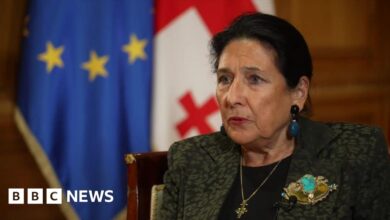Meta, TikTok and Google to be forced to pay for Australian news
Digital platforms will be forced to pay for Australian news regardless of whether they enter new deals with publishers, preventing companies such as Meta side-stepping the news media bargaining code.
On Thursday the Albanese government announced its “news bargaining incentive”, a charge applied to digital platforms which is effectively refunded by an offset if they pay news companies directly instead.
The government does not intend to raise revenue through the measure, because the charge will be set at a level higher than digital platforms would pay under direct deals, incentivising them to pay publishers not the government.
The measure responds to the announcement made in March by Meta, Facebook and Instagram’s parent company, that it would stop funding Australian news through deals with publishers.
The new model will require digital platforms with Australian revenues of more than $250m – at least Meta, Bytedance (TikTok) and Google – to participate by paying a fixed charge or enter direct deals.
Although the government can guarantee that no less money will flow from the platforms to news publishers in global terms, the new system could still disadvantage small publishers if platforms completely offset their liability with deals with bigger publishers.
After it is legislated, the requirement to pay will be backdated to 1 January 2025, and revenue from deals paid after that date will also qualify for offsets.
Consultation will occur in 2025 about the level of the charge, and a distribution mechanism if any platform opts to pay the charge to the government instead of striking deals with media companies.
The government settled on the charge and offset model to prevent digital platforms refusing to carry news as a means to escape a requirement being imposed to bargain with local publishers.
But Meta said the proposal fails to understand that most people don’t come to Facebook for news content.
“We agree with the government that the current law is flawed and continue to have concerns about charging one industry to subsidise another,” a Meta spokesperson said.
The news media bargaining code was introduced in 2021 to address the significant bargaining power imbalance between digital platforms and news publishers.
The code saw digital platforms including Meta and Google pump about $200m into Australian media, whose business model had been disrupted by the growth of digital platforms.
On Thursday Jones said “the government wants Australians to continue to have access to quality news content on digital platforms”.
“Digital platforms receive huge financial benefits from Australia, and they have a social and economic responsibility to contribute to Australians’ access to quality journalism,” he said in a statement.
“This approach strengthens the existing code by addressing loopholes that could see platforms circumvent their responsibility to pay.”
The communications minister, Michelle Rowland, said the government “is committed to a diverse and sustainable news media sector, given this is critical to the health of Australia’s democracy”.
The parliamentary joint select committee on social media and Australian society recommended in October the creation of a “digital platform levy” on companies such as Meta and Google – referred to by some as a “tech tax” – to fund public interest journalism.
The social media committee’s interim report focused on Meta, specifically criticising its decision not to renew deals and the “de-prioritisation of news” on its platforms.
News Corp Australasia’s executive chair, Michael Miller, said the incentive would help to rebuild the industry after the loss of an estimated 1000 jobs this year.
Miller said he would contact Meta immediately to seek to restart the commercial relationship the platform walked away from earlier this year.
“I will also be making contact with TikTok with the intention of reaching a commercial agreement with them as well,” he said.
“I believe news publishers and the tech platforms should have relationships that benefit both parties on commercial and broader terms, and the government has set a clear timetable to conclude discussions.”
Seven West Media’s managing director and chief executive, Jeff Howard, said the government’s commitment would ensure businesses were fairly remunerated.
“An enhanced News Bargaining Incentive means trusted and reliable news will continue to appear on these platforms, combatting the growing problem of misinformation and disinformation,” Howard said.
The independent publisher, Man of Many, said the legislation must also ensure fair support for independent outlets.




